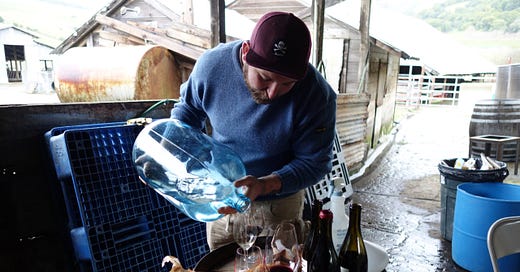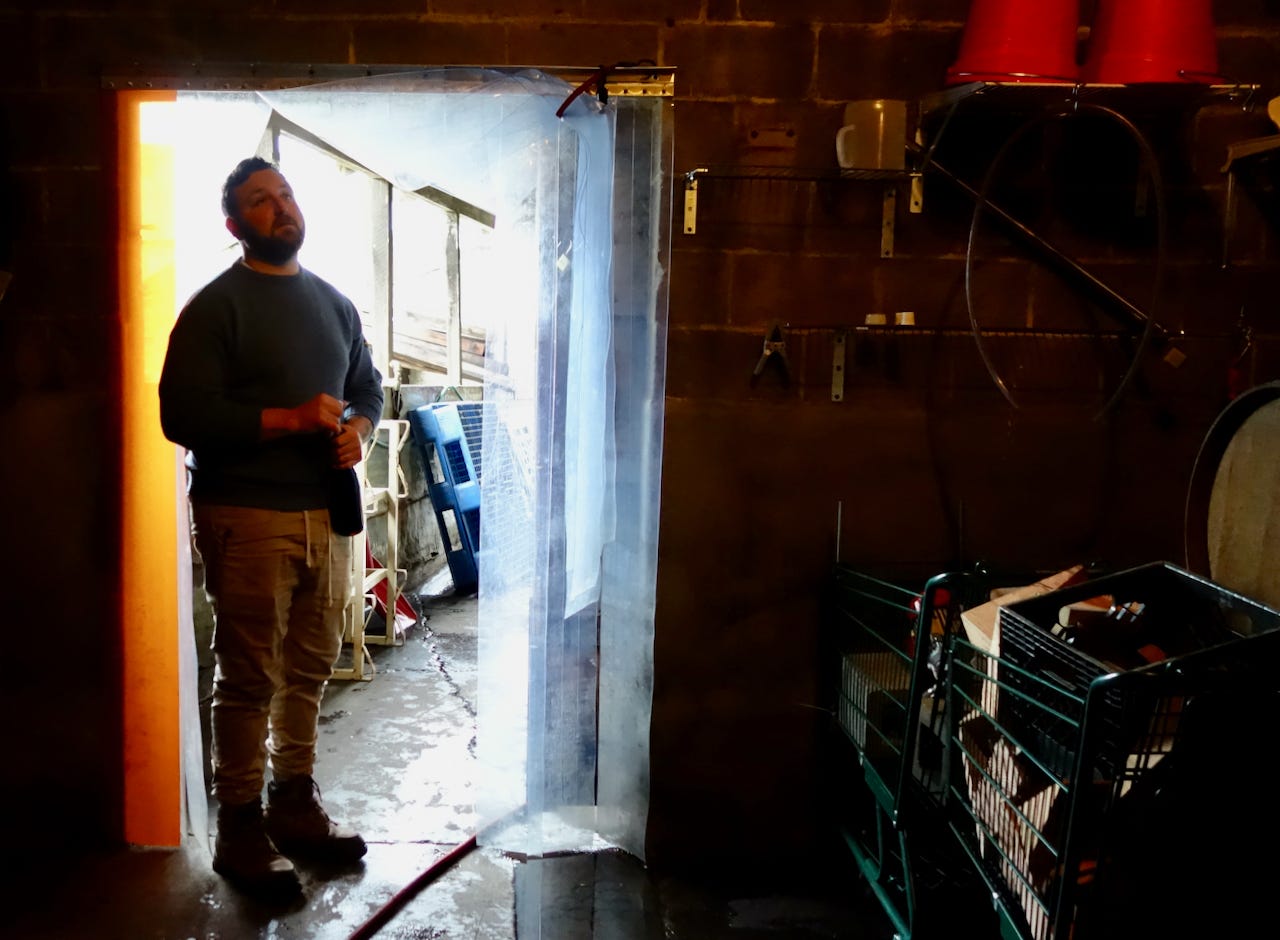CALIFORNIA - Absentee Winery, Point Reyes
Ripe, majestic zero-zero reds from this Marin country acolyte of Tony Coturri and Baptiste Cousin.
Halfway through our tasting with Absentee Winery's Avi Deixler one overcast afternoon in March, the Native Companion and I were surprised to see a big yellow school bus steer past a horde of barking dogs into the long driveway he shares with his landlord. Deixler's winery is housed in a converted dairy farm bordered on three sides by Lagunitas creek; a rickety one-lane bridge connects the farm to the main road. I marvelled at the dedication of the area's school transport system until Deixler explained that his landlord was, in fact, the local school bus driver.
The defunct dairy farm they share is almost majestic in its moribundity. That it should house a scrappy young winery would be unremarkable in certain parts of the Loire or Auvergne. In California, a land of sleek tasting rooms, overweening commercialism, and industrial hygiene, Deixler's approach is a glorious anachronism, bearing the influence of that towering icon of American natural wine, Sonoma's Tony Coturri, for whom he interned before setting up on his own in 2016. Like Coturri, Deixler makes unsulfited, unfiltered, dry-farmed natural wines at defiantly unhip, California-appropriate ripeness levels.
Deixler chose to work in non-viticultural Marin county because he grew up in the area. The nearby town of Point Reyes is a pleasant, touristic cluster of "art" galleries and surf shops; in the other direction, a sequence of beautiful, well-manicured houses luxuriates in the shade of redwoods.
"This county is not an agricultural county," underlines Deixler. "As much as it looks beautiful, it’s all very political."
Merely to begin producing wine on the premises in 2017 (after one vintage produced at a shared facility in Sebastopol), Deixler had to argue his case in court against North Marin Water District, which was reluctant to grant permits to a small-scale winemaking operation without industrial-scale water drainage. Today he still faces an inspection system designed to discourage, if not disallow entirely, artisanal agricultural production.
"It sucks," he says, grinning. I sense Deixler relishes his role - locally, and within the California natural wine scene at large - as the fly in the ointment. His standards of purity in vinification go several stages beyond most of his peers in California, and beyond all but the most radical in France as well. He uses no industrial cleaning products, employing instead his own marc de raisin. He eschews sulfur at all stages of vinification, including barrel maintenance.
"There’s so much shit in industrial winemaking. Even when you go natural," he says. "Something as simple as sulfuring barrels is commonplace for anybody. But I don’t want to do that."
Instead of burning sulfur wicks, Deixler prefers to refurbish his second-hand barrels by hand before use, stripping away layers of wood that may have absorbed winemaking additives from previous owners, and planing away minuscule blisters in the wood that can harbor bacteria. (Some lovely photos of the process can be found in Bert Celce's 2018 piece on Absentee Winery.) It's a skill he acquired mostly on his own.
"Tony [Coturri] told me he used to do it, which was enough for me to start trying," he says. "To do one barrel, it used to take like four-to-five hours. Now I can do two barrels in five hours. I used to do it as a hobby, now I need to get it done. But it’s a really important thing in my winemaking."
Deixler practices a sort of semi-carbonic fermentation in 60-gallon barrel. He opens a barrel, packs in the whole-cluster grape mass, does a bit of foulage, and closes the barrel. This stage of fermentation takes around two months. "Then I press the shit out of it," he says, employing the sort of small vertical press common in Burgundy. The contents of about three barrels fit in each press (since the grape mass tamps down rather a lot during fermentation).
As one might expect from freshly-shaven, un-toasted barrel fermentation and aging, Deixler's wines often show some oak. He doesn't seek this out; rather, I sense he views this as a temporary stylistic sacrifice that will benefit his winemaking operation in the medium term. In 2017 he was able to produce a small quantity of wine from refurbished barrels in their second vintage, and the results were very encouraging.
Most striking is a very, very limited cuvée - one barrel - entitled "NMWD Private Stash," a deep, soulful, juicy carignan with a dense iris nose, a thoroughbred American cousin to Rémi Poujol's masterful work in the Languedoc.
"Western Art," a 2017 Petite Sirah, is rich and heady, a touch opaque, with a dash of acetates on the nose. We taste the 2016, too, another centaur of a wine, but less coltish this time, the alcohol more integrated.
For all the laborious idiosyncrasy of Deixler's vinification method, I find his wines distinguished just as much by their honest ripeness levels. Like his mentor Coturri, Deixler is unafraid of the higher alcohol levels that come with full grape maturity in the region. Alongside his acceptance of oak influence, his style could be confused for 1990's revivalist. But it is a peculiarly American dementia to presume agricultural wisdom should be adjusted according to consumer preferences.
Deixler's early internships spanned the globe, and many farming styles. (In France, he worked for Baptiste Cousin in Anjou, John Schmitt in Corbières, and Domaine des Gandines in the Mâconnais.) But by his own admission his experience in viticulture amounts to little more than harvest and pruning. For now his fruit purchases derive from Poor Family Vineyards in Mendocino.
"I've been sort of looking for vines to lease or buy the production around here," he says. "And it becomes really apparent how hard it is. I don’t know if it’s hard to farm organically or farm well, or if it’s just hard to convince people that it’s an okay thing to do. Like, break your back a couple days a year instead of spraying Roundup. That's hard for people to imagine."
His words speak to one of the less tangible gaps between US wine culture and those of many old-world nations: that of lifestyle expectations. I suspect many US winemakers would laugh if one were to hand them a hoe; their time is worth more. Not Deixler, who, in the absence of vines to his name, seems to create as much manual work as possible in the cellar. He is one of those admirable figures whose brain resides, at least partly, in his arms, his hands, his fingertips. One hopes he gets them on some vines sooner or later.
Absentee Winery
14500 Pt. Reyes - Petaluma Rd
Point Reyes Station, CA 94956
USA
Tel: +1 415 669 7600
FURTHER READING
Bert Celce's superb, in-depth 2018 piece on Absentee Winery at Wine Terroirs. It includes excellent detail shots of Deixler's barrel reconditioning process.
A 2018 feature on Absentee Winery in the San Francisco Chronicle.
Alex Bernardo's profile of Absentee Winery at Vineyard Gate.
A terrific 2018 feature on Absentee Winery in Point Reyes Light. The reporter really helpfully puts Deixler's work in the context of his peers in the CA natural wine scene.








